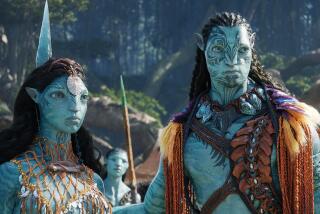Orson Scott Card’s antigay views prompt ‘Ender’s Game’ boycott
The books of the bestselling, award-winning “Ender’s Game” science-fiction series, about child soldiers in space, are almost universally beloved. The same cannot be said for their author, Orson Scott Card.
Over the years, Card has spoken and written publicly about his opposition to gay rights and gay marriage -- to the extent that one group, Geeks OUT, felt compelled to speak up about it. On the website SkipEndersGame.com, they call for a boycott to the film adaptation coming in November.
They quote Card writing in 1990, “Laws against homosexual behavior should remain on the books, not to be indiscriminately enforced against anyone who happens to be caught violating them, but to be used when necessary to send a clear message that those who flagrantly violate society’s regulation of sexual behavior cannot be permitted to remain as acceptable, equal citizens within that society.”
In the Mormon Times in 2009, he wrote, “Married people attempting to raise children with the hope that they, in turn, will be reproductively successful, have every reason to oppose the normalization of homosexual unions.”
Now with the boycott, he’s asking for tolerance. “Now it will be interesting to see whether the victorious proponents of gay marriage will show tolerance toward those who disagreed with them when the issue was still in dispute,” he wrote in a statement to Entertainment Weekly.
Does it make sense to boycott a film because of the political views of the original work’s author? Geeks OUT urges people to pledge not to see the film in theaters, not to rent or buy the DVD, not to stream it, and to eschew its toys and merchandise. “However much you may have admired his books, keep your money out of Orson Scott Card’s pockets,” the group writes.
In his EW statement, Card wrote, “‘Ender’s Game’ is set more than a century in the future and has nothing to do with political issues that did not exist when the book was written in 1984.”
In fact, the “political issues” he talks about were very much alive in 1984. The fight for the civil rights of lesbian, gay, and transgendered people had gone on for years, and back in 1970, Los Angeles held the first of many celebratory gay pride parades.
The boycott’s greatest effect may be to raise awareness -- perhaps even Card’s.
ALSO:
Harper Lee’s tragic ‘To Kill a Mockingbird’ lawsuit
Apple conspired to set e-book prices, judge finds
Roberto Bolano’s ‘2666’ released as e-book for the first time
Carolyn Kellogg: Join me on Twitter, Facebook and Google+
More to Read
Sign up for our Book Club newsletter
Get the latest news, events and more from the Los Angeles Times Book Club, and help us get L.A. reading and talking.
You may occasionally receive promotional content from the Los Angeles Times.







